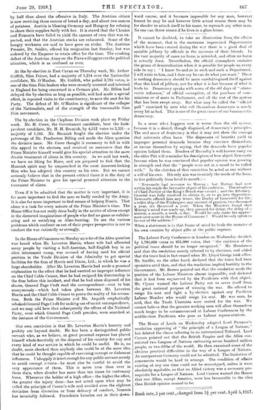It cannot be doubted, to take an illustration from the
affairs of the moment, that in the enormous improvised Departments which have been created during the war there is a good deal of amiable jobbery by officials in the interests of their friends. In the vast majority of cases no harm is intended, and often no harm is actually done. Nevertheless, the official atmosphere contains the germs of demoralization when it is possible for people on every side to say : " I know So-and-so in such-and-such a Department. I will write to him, and I dare say he can do what you want." There is nothing democracy should be more careful to guard itself against than this kind of jobbery, not for what it is but because of what it leads to. Democracy speaks with scorn of the old days of " aristo- cratic influence," of official corruption, of the purchase of com- missions or of seats in Parliament•, and all the rest of the system that has been swept away. But what may be called the " official pull " exercised by men who call themselves democrats is surely every bit as bad. This is one of the great curses of our bureaucratic democracy.


























 Previous page
Previous page